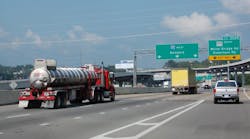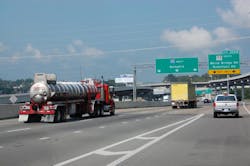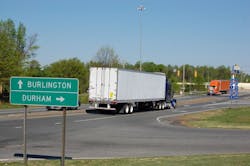You can’t go far today without hearing about how health and wellness affect productivity in the workaday world.
Indeed, truck driving is one job where health and wellness are critical performance factors, especially in terms of fatigue behind the wheel.From a far broader perspective, a recent study is now drawing new connections between what’s euphemistically called “unhealthy individual lifestyle choices” (can’t we just say smoking, obesity, and lack of exercise for Pete’s sake?) and substantially higher levels of lost productive work time.
Researchers from Brigham Young University (BYU), the Health Enhancement Research Organization (HERO) and the Center for Health Research at Healthways helped craft this wide-ranging study using cross-sectional survey data from 19,803 employees working at three large, geographically dispersed companies.
Their research concluded that even one unhealthy behavior increases the likelihood of lost productivity. For example, employees with an unhealthy diet were 66% more likely to report having experienced a loss in productivity than those who regularly ate whole grains, fruits and vegetables.
On another front, those researchers discerned that employees who exercised only occasionally were 50% more likely to report having lower levels of productivity than employees who were regular exercisers. Finally, smokers were 28% more likely to report suffering from a drop in productivity than non-smokers.
Part of this research delved into a new “wellness” topic called “presenteeism,” which is defined as being present at work yet not performing “optimally.” (I think we all know what that looks like!)
“Total health-related employee productivity loss accounts for 77% of all such loss and costs employers two to three times more than annual healthcare expenses,” noted Ray Merrill, a professor at BYU’s Department of Health Science and a lead author on this study.“This study, which analyzes an unusually large and geographically dispersed population, represents a more comprehensive understanding of the multitude of factors that drive presenteeism, thereby improving employers’ ability to meaningfully address this issue,” he said.
Findings related to physical health and healthy behaviors also revealed that employees who had difficulty exercising during the day were 96% more likely to have increased productivity loss. Those employees who rarely eat fruits, vegetables and other low-fat foods at work were 93% more likely to have a higher loss in productivity.
In addition, those who did not believe their workplace environment would support them in becoming physically and emotionally healthier were more likely to have a drop in productivity levels, noted Dr. James Pope, vice president and chief science officer for Healthways.
“We know that comprehensively measuring well-being helps employers take steps to understand the drivers of lost productivity in their setting and take pertinent steps to reduce it,” he pointed out.
“Our research confirms that employee productivity loss is associated with low well-being, poor health behaviors, elevated health risks, and the presence of chronic disease,” Pope said. “This information is significant because the number of employees with excess body fat, poor diets, diabetes and sedentary lifestyles has risen to unprecedented levels in the nation.”Along with health-related factors, work-related factors such as not having enough time to perform job duties and insufficient technological support and or resources, had a strong and significant influence on worker productivity loss. Personal problems and financial stress also contributed substantially to productivity loss, the researchers found.
Factors contributing less to a loss in productivity included physical limitations, depression or anxiety, inadequate job training and problems with supervisors and co-workers.
The study also revealed that a productivity loss was highest among those aged 30 to 39 and was lowest among those 60 and older. It was more prevalent among women than men and among those separated, divorced or widowed than married individuals.
Here’s a kicker for trucking: Clerical or office workers in the service and transportation industries experienced the highest levels of productivity loss, according to the study's findings, while the lowest level of productivity loss went to employees in more “active” industries such as farming, forestry, fishing, construction and mining.
“It’s critical that companies look deeper at productivity loss and measure it to understand the impact it is making on their bottom line,” added Jerry Noyce, CEO of HERO. “Business leaders have the ability to reduce the factors that significantly impact productivity loss by implementing comprehensive, best practice workplace wellness programs focused on well-being improvement, which in turn, can lead to improvements in employee satisfaction, productivity and profitability for employers.”
OK, great: but what about truck drivers, you ask – and rightly so. How does one get truckers sitting behind the wheel for 11 hours at a stretch hundreds, if not thousands, of miles away from home focus on their physical and mental health to a far higher degree?Well one way would be to treat them like U.S. Army Rangers.
Really? Yes, really. In fact, this is a recommendation I got from an interview with Gary Krueger, principle scientist and chief ergonomics researcher for The Wexford Group – a human factors consulting firm – conducted almost eight years ago.
Where Dr. Krueger is today, I don’t know, but he laid out to me back then one of the most interesting approaches to enhancing truck driver health and wellness I’ve ever heard – then or since.
“We used to believe that camaraderie and a basic level of physical fitness used to translate into a soldier’s ability to sustain operations in the field,” he told me. “What we’re finding out now is that physical fitness and training has a far greater impact on field performance than we thought.”
The U.S. Army Rangers, Krueger explained, go so far as to focus on strength training for their neck and shoulders because that is where most of the load they carry into the field – ammunition, weapons, supplies, etc. – gets placed.
“They also take a more ‘holistic’ view of training, recognizing that diet, specific kinds of exercise, and good lifestyle habits all impact their combat performance capability,” he stressed.
That holistic view has quite a bit of “carry over” into the truck driver’s world, Krueger told me at the time. “We’re finding that a focus on the entire ‘aura’ of wellness – exercise, proper diet and nutrition, and the elimination of smoking – can have a dramatic impact on a truck driver’s job performance,” he explained.
And by “performance” he means both conscious and unconscious responses.“For one, we find that people with a greater focus on health and wellness pay more attention of sleep discipline – they are far more aware of how important sleep is in terms of affecting job performance,” Krueger pointed out. “On another level, we’re finding health issues that impact truck driver performance – such as sleep apnea – are driven by fitness levels; and apnea is more prevalent in those suffering from obesity.”
Health and fitness can also improve a variety of other skills, especially reaction time, he said. “And a basic level of fitness helps protect against injuries – a key concern for soldiers on the battlefield, but also a concern for drivers and the companies that employ them,” he added.
The physical fitness and overall health of the aging truck driver population in the U.S. also continues to a growing concern among industry experts because fitness relates so strongly to job performance, Rebecca Brewster, president & CEO of the American Transportation Research Institute (ATRI) told me in a separate interview not long ago.
“Certainly, the more physically fit and healthy drivers are, the more alert and less fatigued they are,” she explained. “Being physically fit also makes them less susceptible to injury as an increased fitness level gives them more body strength and flexibility – critical aspects when loading and unloading trailers, for example.”
Yet the overall prognosis for truck drivers isn’t good. Brewster said that, according to recent research, 55% of truck drivers overweight and more than 50% smoke, compared to a national overall average of 20.9% and 25%, respectively.
Those are some tough numbers, no doubt. But think on this: what if truck drivers were treated – and trained to a certain degree – like U.S. Army Rangers? Like an elite corps of individuals with skills few of the general population could master? (Which of course exactly what driving a big rig is. But I digress.)
I’d bet you there’d be a very positive response to treating truck drivers in this fashion, as many are themselves veterans of every branch of the U.S. military, with deep appreciation for values such as discipline and hard work, among others.
Just a thought.








